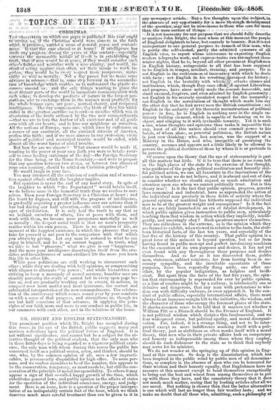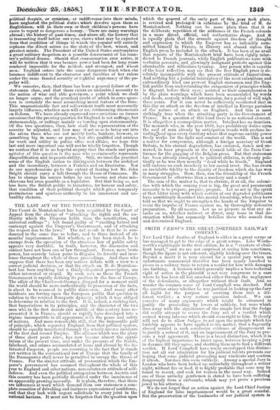• MR. BRIGHT AND ENGLISH STATESMANSHIP.
THE prominent position which Mr. Bright has occupied during this !Teen in the eye of the British public suggests many and anxious reflections upon the political future of England. It is not without significance, and cannot but be a subject for the at- tentive thought of the political student, that the only man who in these latter days is being regarded as a vigorous political exist- ence, the only man with whom during this recess the public has concerned itself as a political orator, actor, and thinker, should be one, who, by the common opinion of all, save a few impracti- cables, is permanently disqualified for high office. To some per- sons, and we confess ourselves to be of the number, this appears to be the consecration, temporary, as must needs be, but still the con- secration of the principle of moral irresponsibility. To others it may appear a sign of that so-called happy growth of the time, which substitutes general laws, and public opinion in the affairs of states for the operation of the individual conscience, energy, and judg- ment. Here is an issue, here is a question of the proper interpre- tation of an indisputably certain fact of the hour' which we think deserves much more careful treatment than can be given to it in iiynewspapes f artiolm, Bunn few, thoughts uponitlies hubjeet, in the abience-pf a4, opportunity Air fa Isere Iblyedegfr ideisclopment of the --questipnmay. not beck/welcome to ftheie ha @ere ids:limns thanithe niereisurfaeene'thisgseef a arro-t9wmb oa JlItN91 oi e • tl'it ia mot lieetssãry for but purpora i that (ivti oilruldi &Ally clinraihe Or faxialyze- John !Bright* theenawwhom atithisltaement the people of.Englandalelightelletb briar; but seegoelly tu)hooithmidtitis not unimportant to oi general:, purpOse .tmiremarkfof this !maas -who is ,partly!Alte- self--elected; partly -,theratiteittEil cyhosureeof all English :dyes; to :report Whose utterances' toi-nixpeotillgliBnglish readers telegraphs work, and evprese-trains runittionghontthese winter nights, that he is, beyond 'all othernproutinent Englishmen in English histfary, -antagonistic to all that has been supposed to' be English in-temperrintelleet, training,- and purpose. He is not English in the,recklassnese of inaecurae -with Which he-deals
with facts ; not -EngliSh -his revolting' espeet.forhistory;
not English in the brutality with whic ; attacks classes and institutions, which, though they-once offe AegainetLibemlism and; progress, have since nobly ,made the w 'Jinn& 4ionornble, and stand excused, forgiven, and evenadniikeelby.Englistgenerosity ; not English in hisiicaroely-simulated. ',respect. for, the monarchy ; notl.'nglish in, the materialism:of -thought which made him say the other day that he-had never seen the -British constitution; not English in the:audacity of.his theoretic reoonsitauctiondf.political power ; in fine, he is English.;intiething save hi/the single re- siduary bulldog- element, which is oapcble of fastening 'onto its ohjeet, and clinging to it witliinvinoible tenacity. Yet it is-such a dne, whose thoughts and. Opinions; thus makeit impossiblethat any, least of all this -nation should 'ever commit power .telhis hands, of whom alone, as powerful politician,: the British nation is just now thinking; who, last session, was the support. of Ministry in the -House, . and who,' inqapable ,of governing'- the country, assumes and appears not a-little likely to be. allowed to govern the political destinies of the by whom it is or pretends to
be governed. . . .
Of course upon the theory that the age of statesmanship is past all this matters but little. .J.f it be true that there is no room left' in the high places of the state for the exercise of free thought, wise guidance of the people, political meditation and honestly .s1d1-. ful political action, we can all luxuriate in the fascinations of the orator in whom we do not believe, and it is absurd and out of date to consider whether we should expend so much ,admiration and attention upon one whom we cannot politically trust. But is this - theory true ? Is it the fact that public opinion, progress, general laws economical and industrial, have so superseded the action of the individual man precisely in those fields of activity where the general opinion of mankind has hitherto supposed the individual man to be of the greatest weight and. consequence? Is it the fact that we are fairly launched in an era of fatalist development, in which public opinion gives instruction to public men, articulately teaching them that wisdom in action which they implicitly, intelli- gently, and unerringly obey ? Such questions answer themselves. They are ridiculous in the extreme, as is the opinion which they are framed to exhibit, when viewed in relation to the facts, the stub- born historical facts, of the last ten years, and especially of the last five of the history of this country. That public opinion is a great force at this moment is beyond question, but so far from having found in public men apt and perfect involuntary machines for the execution of its own purposes and desires, it has not yet even found. with any thoroughness those purposes and desires themselves. And so far as it has discovered them, public men, statesmen, cabinet ministers, far from having been in ne- cessary sympathy, and the inevitable executants of those purposes, have been repeatedly flung aside, one after an- other, by the popular indignation, as helpless and. ineffi- cient. But apart from the facts of the last five years, the opin- ion that statesmanship is superseded for ever by public opinion, as a line of coaches might be by a railway, is intrinsically one so delusive and dangerous, that any man with pretensions to wis- dom can with difficulty embrace, or even approach it. In the con- duct of public affairs, especially international affairs, there must always be an immense margin left to the initiative, the wisdom, and the character of those who occupy the foremost places of the state. It shocks common sense to be told that it matters not whether a 'William Pitt or a Disraeli should be the Premier of England. It is not political wisdom which dictates this fundamental, and we fear widespread error, but political apathy, and moral disorgani- zation. For, indeed, it is a strange thing, and not to be inter- preted except as mere indifference masking itself with a poli- tical theory, just as sinfulness so often masks itself with a moral theory, that men who in their private affairs look on competency and honesty as indispensable among those whom they employ, should do such dishonour to the state as to think that anybody may serve for its minister. We do not wonder at the springing up of this opinion in Eng- land at this moment. So deep is the dissatisfaction which has been inspired in the public mind by public men of all denomina- tions, so complete is the absence of men who can be honoured for their wisdom and their honesty equally, that Englishmen have no resource at this moment except to bend themselves energetically to bring out the best and wisest from among themselves or to put up with those they have, and the consolatory theory that it does not much much matter, seeing that by leading articles after all we are saved. But nothing is clearer than that the latter alternative is one which will last no longer than fair weather lasts ; and we make no doubt that all those who, admitting, such a philosophy of golaltiehladesPairs stristeistassof sindifferetioelinto, tliMrsminds; ,aaigleiteststhe_pefitioal dutiesoiritith ilevolve iipona them as Englishmen; will :in:their own en theif perscrns bine cause to repent so dangerous a hereeyisii There ere many warnings abroad iiiiitoryntspaslatintesis attirbabwre aalli the. history that
transaeting it :before court ayesitshdwsl*hat may beresipeeted fromt that Sion dition4 ofl things sinatbiohd the popular :will entirely replaces the direcli station einn Alna statesof the: best; 'wisest and greatestminds: TheIPiesideint (Atha United States centeinplatei
-great!military, despetism,asaic 1 possible denouement-of bit -coun4 try's.pnlitical dramas ,Shoulit that ebnsunsmation, ever .arrive, it will be Written that it was bedimie poiv'er had been for long years tendered impossible for the noblest,' and strongest, and :wisest men. England enters into the ,same dangerous track when the becomes' indifferent to the character and faculties of her riders under thesame fancied security of rightful supremacy of the pas pular- will.. We eanCeive, then, that there 'has been a 'general failure of the statesnian, clas'and that • there exists an undoubted necessity to the nation- of wise and able 'governors, a point Which we shall no longer 'argue, and the practical doubt of which in setae quar- ters is certainly the most iatortishinganoral feature of the time. This unquestionable -fait and self-evident trutlimitist neceaaarily largely influence, whether men will or nes forthcoming discussions on Reform. 1Ve have .alretudy expresteddur convictions on former occasions that the pressing question for England in not Suffrage, but statesmanship, or suffrage mainly as-bearing upon statesmanship. Of 'the two -questionssahen,l how shall: the repreeebtatiOn of the cotintry be adjusted, and how may it: act so as to bring out into the-arena these 'who are not merely lords, bankers, brewers, or something big in name or purse, but. also qualified and anxious for work andsutility izt public office and affairs, we hope this lastandinorerimportant one will not be wholly forgotten. Thengh we Confess that-it- is no hopeful augury that the oracle and prime. agitator of this question is the man who preeminently represents disqualification and impracticability. I "Still, we trust the practieal sense of the English nation to distinguish between the architect and the incendiary, between a 'Pericles dud Erostratus. Nor do our apprehensions -go to. the extent of fearing lest Mr. John Bright should carry a bill through the House of Commons. He has to change his nature before he can become not alone mis- chievous but even possible as a legislator. But that being so, not less have the -British public to transform, for honour and safety, that condition of their political thought which gives temporary preeminence and spurious authority to his incoherent and un- healthy rhetoric.



























 Previous page
Previous page